Ever looked at your driveway and felt frustrated by those dark, stubborn oil spots that just won’t go away? You’ve scrubbed, washed, maybe even tried a few random hacks, but the stains always seem to stick around. It’s annoying, especially when you’ve worked hard to keep your home looking nice. If you’ve been wondering what the best oil stain remover for an asphalt driveway really is, you’re definitely not alone.
In this post, we’ll walk you through the most effective ways to clean those pesky stains for good. From everyday household items to professional-grade solutions, you’ll learn what actually works and what to avoid. By the end, you’ll know exactly how to restore your driveway’s clean, dark finish without damaging the asphalt underneath.
Dish Soap
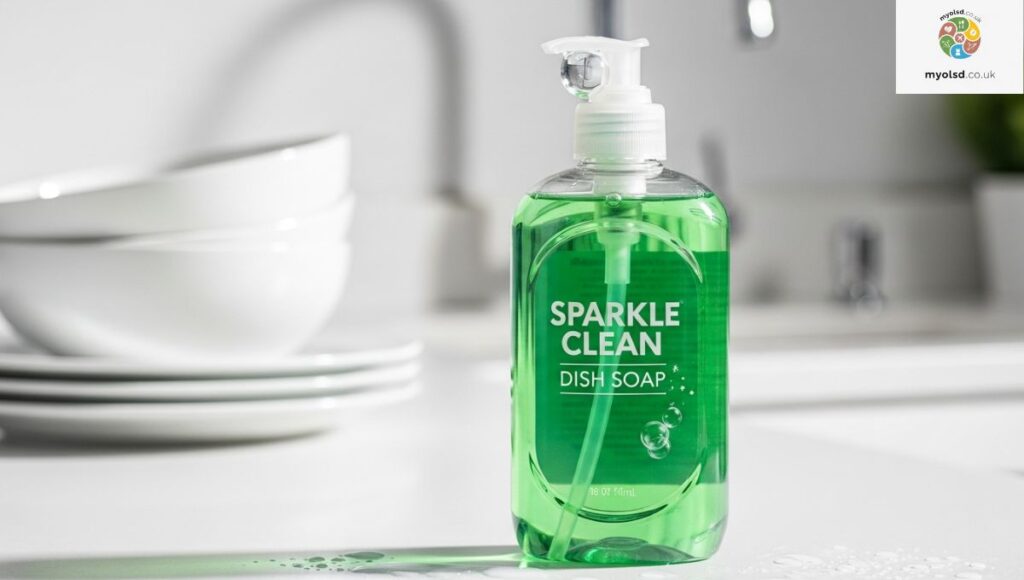
Sometimes, the simplest solutions work wonders. Ordinary dish soap is one of the easiest and most accessible ways to tackle fresh oil stains on your driveway. The soap cuts through grease just like it does on your dishes, breaking down the oily residue before it seeps deeper into the asphalt surface.
Start by applying a generous amount of dish soap directly onto the oil stain. Use a hard-bristle brush to scrub the surface and break up the slick layer. Once you’ve agitated the area, rinse it off with a garden hose. This method works best for fresh stains, especially when combined with warm water for better degreasing action.
Powdered Detergent
For slightly older or stubborn stains, powdered detergent can help lift oil from the asphalt pavement effectively. The detergent granules act as a mild abrasive while the cleaning agents dissolve the oil molecules.
Sprinkle a thick layer over the affected area, then lightly wet it with warm water. Scrub it using a stiff brush and let it sit for about 15 to 20 minutes. Rinse thoroughly, and you’ll notice the stain fading. Repeat as needed. This is an affordable and eco-friendly solution for light maintenance between professional cleanings.
Cat Litter
Yes, cat litter isn’t just for your feline friend; it’s also great for absorbing oil. This trick works best right after a spill. Pour a generous amount over the stain, covering it completely.
Let it sit overnight so the absorbent materials can soak up the oil. The next day, sweep it away and use dish soap or detergent to finish cleaning the residue. For large oil spills or fresh drips, cat litter is one of the easiest household products to use. It helps prevent deeper asphalt damage by absorbing the oil before it penetrates.
Baking Soda
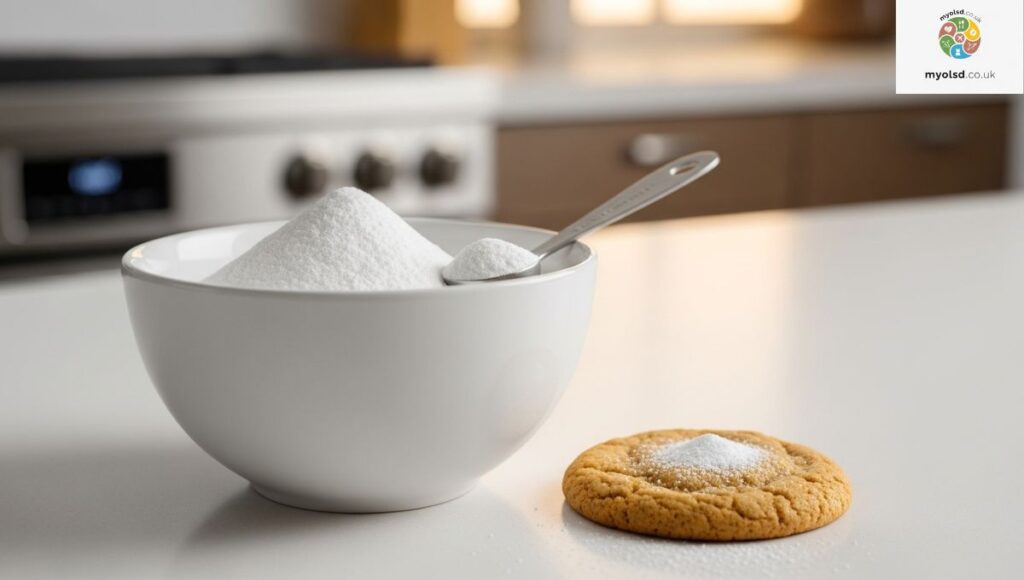
Another household hero, baking soda, works as a mild degreaser and abrasive cleaner. It’s non-toxic, inexpensive, and safe for asphalt. Sprinkle it over the stain, add a few drops of water, and scrub with a hard-bristle brush.
Leave the paste for about 30 minutes, then rinse off with a hose. You may need to repeat the process for older stains, but it’s a great, eco-friendly way to handle small driveway spots without harsh chemicals.
WD-40
If you’ve got stubborn oil stains that won’t fade, WD-40 can help loosen the oily buildup. Spray it directly onto the affected area, let it sit for 20 to 30 minutes, and then scrub it thoroughly.
WD-40 breaks down the oil molecules and lifts them from the asphalt surface, making it easier to rinse them away. Just remember to rinse thoroughly with water afterward to avoid any slick residue. This method is effective for older grease stains and automotive fluids.
Oven Cleaner
Oven cleaner may sound harsh, but it’s excellent for cutting through deep, baked-in oil stains. Spray it generously over the mark and let it soak for 10 to 15 minutes.
Then scrub with a stiff brush and rinse with water. This method should be used sparingly since some oven cleaners contain strong chemicals that may affect asphalt integrity if left too long. Always test a small patch first before applying it to a large area.
Cola
Believe it or not, Cola (yes, the soda!) can help dissolve oil stains thanks to its acidity. Pour a can or two over the area and let it soak overnight.
In the morning, scrub gently and rinse. The cola method is more of a quick fix than a permanent solution, but it can help lighten the stains significantly. Plus, it’s a surprisingly cheap experiment if you’re out of cleaners.
When Stains Get the Best Out of Your Asphalt
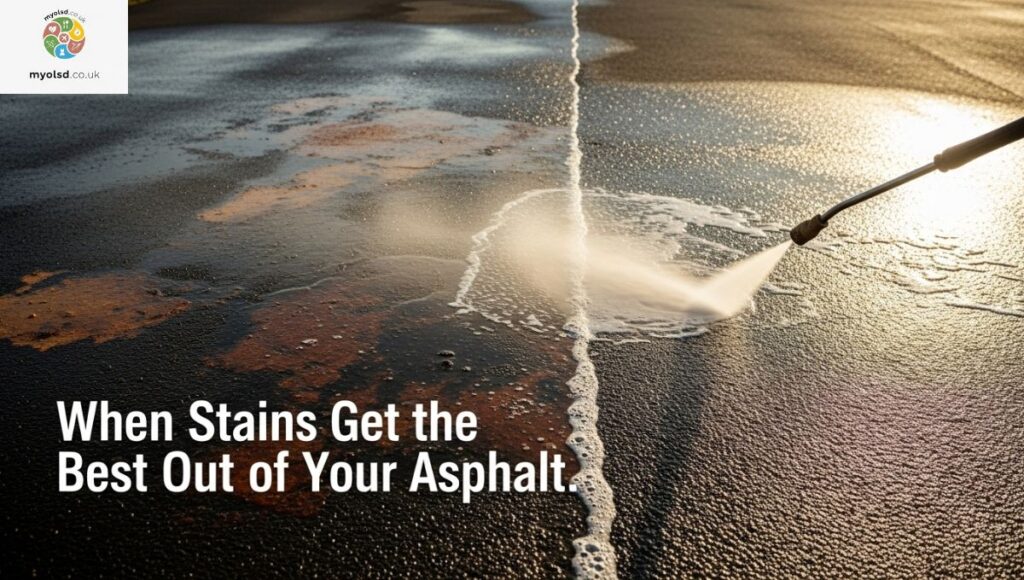
Sometimes, even after trying multiple household remedies, the stains won’t completely disappear. Deep-set stains, especially from transmission fluid or brake fluid, can penetrate through the asphalt binder.
If this happens, don’t panic. You can still restore your driveway’s appearance using a professional degreaser or by applying a fresh asphalt layer. The key is not to let oil sit too long; prompt treatment prevents asphalt deterioration and crack formation.
Use a Professional Degreaser
When home methods fail, a professional-grade degreaser is the next best step. These products contain industrial-strength cleaners that break down hydrocarbon-based stains effectively.
Apply the degreaser, allow proper soak time, and scrub using a stiff brush before rinsing thoroughly. Products like Oil Eater Cleaner, Zep Industrial Purple Degreaser, or Simple Green Pro HD are trusted options used by many paving companies and asphalt contractors. They’re designed for commercial services and deep cleaning tasks.
Apply a Fresh Layer of Asphalt
If your driveway has permanent discoloration or oil penetration that has weakened its surface, consider applying an asphalt overlay.
A thin new layer can restore asphalt integrity, fill minor cracks, and renew the blacktop finish. For best results, hire a professional paving service to ensure proper surface preparation, bonding, and sealcoating. This investment enhances driveway longevity and curb appeal.
Oil and Grease Stain Prevention
Preventing stains is much easier (and cheaper) than removing them. Regular driveway maintenance keeps your surface strong and attractive.
Apply a driveway sealer every 2 to 3 years to protect against ultraviolet rays, water damage, and oil penetration. Keep an absorbent material like cat litter or baking soda handy for emergencies, and always fix small cracks before they expand. Simple maintenance tips like these can save you from expensive asphalt repair in the long run.
Read more Article: Things That Inspire People
Why Oil Stains Are a Problem for Asphalt Driveways
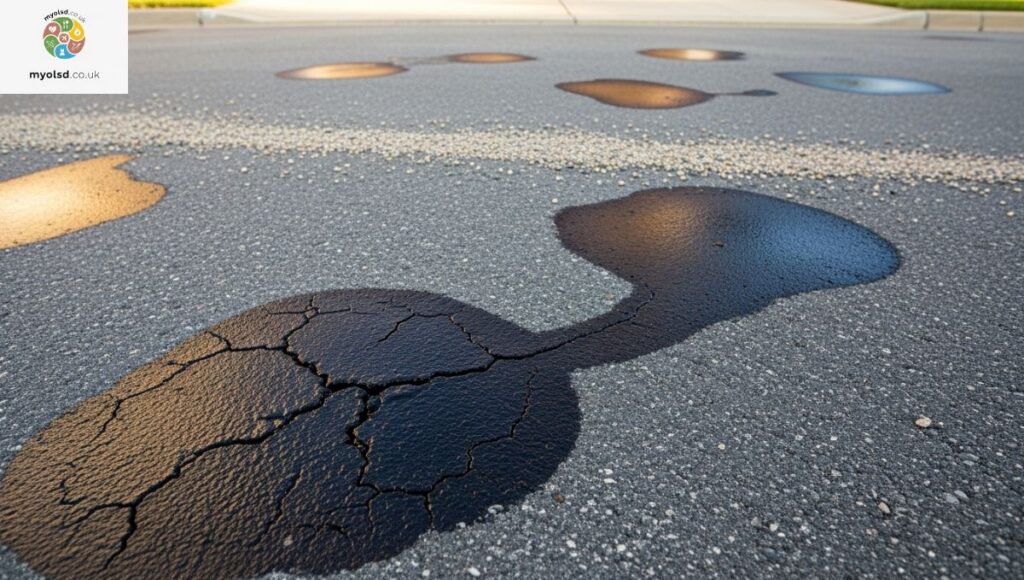
Oil stains aren’t just cosmetic; they slowly eat away at the bitumen binder that holds asphalt together. Over time, this causes structural integrity loss, surface deterioration, and even potholes.
That’s why choosing the best oil stain remover for an asphalt driveway isn’t only about appearance; it’s about preserving your investment. Keeping your asphalt driveway clean ensures a longer lifespan and better resistance against weather and wear.
What Are Commercial-Grade Degreasers?
Commercial-grade degreasers are powerful chemical solvents formulated to break down petroleum-based materials like oil, grease, and tar.
Unlike household cleaners, these contain ingredients like sodium hydroxide or biodegradable formulas designed to dissolve heavy buildup quickly without damaging the asphalt surface. Always read product labels carefully before applying to ensure environmental safety.
Common Ingredients Include:
- Sodium hydroxide
- Biodegradable surfactants
- Non-toxic cleaning agents
- Petroleum emulsifiers
- Water-based solvents
These components ensure deep cleaning, quick hydrocarbon breakdown, and effective surface protection without harming asphalt.
Top Commercial-Grade Degreasers for Asphalt Oil Stains
Here are some of the most trusted options available today:
Oil Eater Cleaner & Degreaser
A biodegradable, non-toxic option ideal for residential and commercial use. It’s safe, effective, and affordable.
Zep Industrial Purple Degreaser
A powerful industrial cleaner known for cutting through thick oil residue. Best for tough stain removal on large surfaces.
Simple Green Pro HD Heavy-Duty Cleaner
Perfect for those seeking an eco-friendly cleaner that still delivers industrial-strength performance.
Purple Power Industrial Cleaner/Degreaser
Effective for grease stains and automotive fluids. It’s one of the most commonly used commercial-grade degreasers for driveway cleaning.
How to Use a Commercial Degreaser on Asphalt Oil Stains
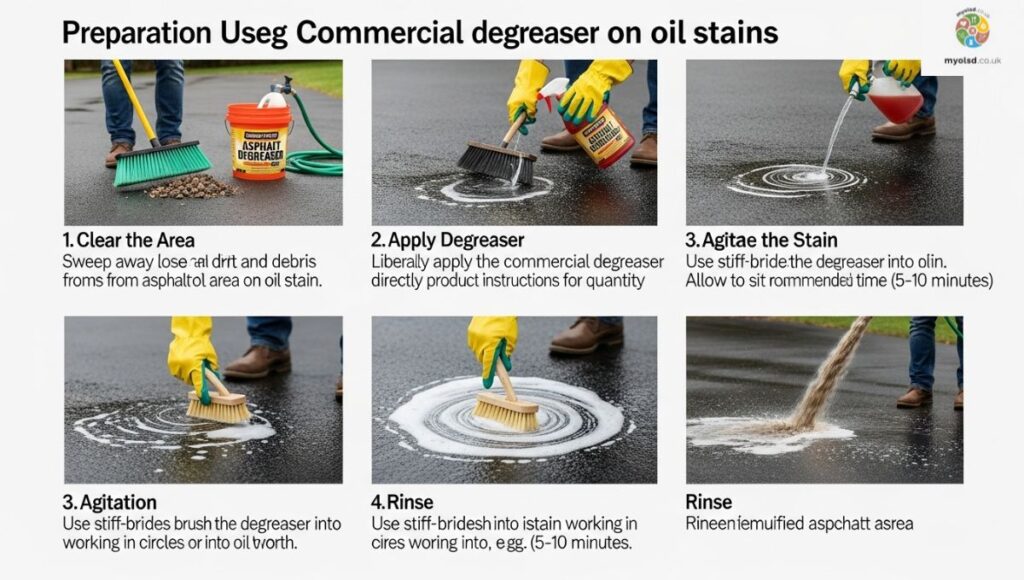
- Clear the area of debris and dirt.
- Apply the degreaser evenly on the stain.
- Allow proper soak time (10 to 15 minutes).
- Scrub using a stiff brush or broom.
- Rinse thoroughly with hot water.
- Repeat if necessary for deeper stains.
Step-by-Step Instructions:
- Avoid applying in direct sunlight.
- Always wear gloves for protection.
- Test a small area first.
- Follow product label directions carefully.
- Rinse the area thoroughly to prevent residue.
Tips and Tricks from the Pros
- Treat spills as soon as they occur.
- Don’t use pressure washers on cracked asphalt.
- Reapply sealcoat after heavy cleaning.
- Use absorbent materials like cat litter first for fresh spills.
- Schedule routine driveway maintenance annually.
What If the Stains Won’t Come Out?

If you’ve tried everything and the stains still linger, it may be time for asphalt resurfacing or professional service. Asphalt contractors can grind off the damaged layer and apply a new coating to restore your driveway’s look and strength.
While this option costs more upfront, it ensures long-term pavement protection, prevents cracks, and improves property appearance.
Final Thoughts
Finding the best oil stain remover for an asphalt driveway doesn’t have to be complicated. Start with easy household fixes like dish soap, baking soda, or cat litter, and if those don’t work, step up to a professional degreaser or asphalt restoration.
Keeping your driveway clean not only improves curb appeal but also protects it from asphalt deterioration and costly repairs. A little care today saves you a lot of hassle tomorrow.
FAQs
How do you get oil stains out of an asphalt driveway?
Use dish soap, baking soda, or a professional degreaser to break down the oil. Scrub the area with a stiff brush and rinse thoroughly with water.
What is the best oil stain remover for asphalt?
Commercial-grade degreasers like Oil Eater, Zep Industrial Purple, or Simple Green Pro HD are among the best oil stain removers for asphalt driveways.
Does WD-40 remove oil from tarmac?
Yes, WD-40 can help loosen and lift oil stains from tarmac. Spray it on the spot, wait about 30 minutes, then scrub and rinse clean.
Are oil stains on asphalt permanent?
Most oil stains can be removed with proper cleaning or degreasing. However, long-set stains may require resurfacing or applying a new asphalt layer.
Can a degreaser remove asphalt?
A strong degreaser can damage asphalt if left too long. Always follow product instructions and rinse thoroughly after cleaning.
Will Dawn remove oil stains from asphalt?
Yes, Dawn dish soap works well for small or fresh stains. It breaks down grease and helps restore the surface color.
How long do we let Dawn sit on an oil stain?
Let Dawn sit for about 15 to 20 minutes before scrubbing. This gives it enough time to dissolve the oil.
Will bleach get oil off a driveway?
Bleach isn’t ideal for oil stains; it can discolor asphalt and doesn’t break down oil effectively. Use a degreaser instead.
Does vinegar remove oil stains from concrete?
Vinegar may lighten minor stains, but it isn’t powerful enough for deep oil marks. A stronger cleaner or degreaser works better.
Does Coca-Cola remove oil stains from tarmac?
Yes, the acids in Coca-Cola can help loosen oil stains. Pour it over the area, leave it overnight, then scrub and rinse.
Can oil stains be permanently removed?
In most cases, yes, especially with timely cleaning and the right remover. Deep or old stains might need professional resurfacing.

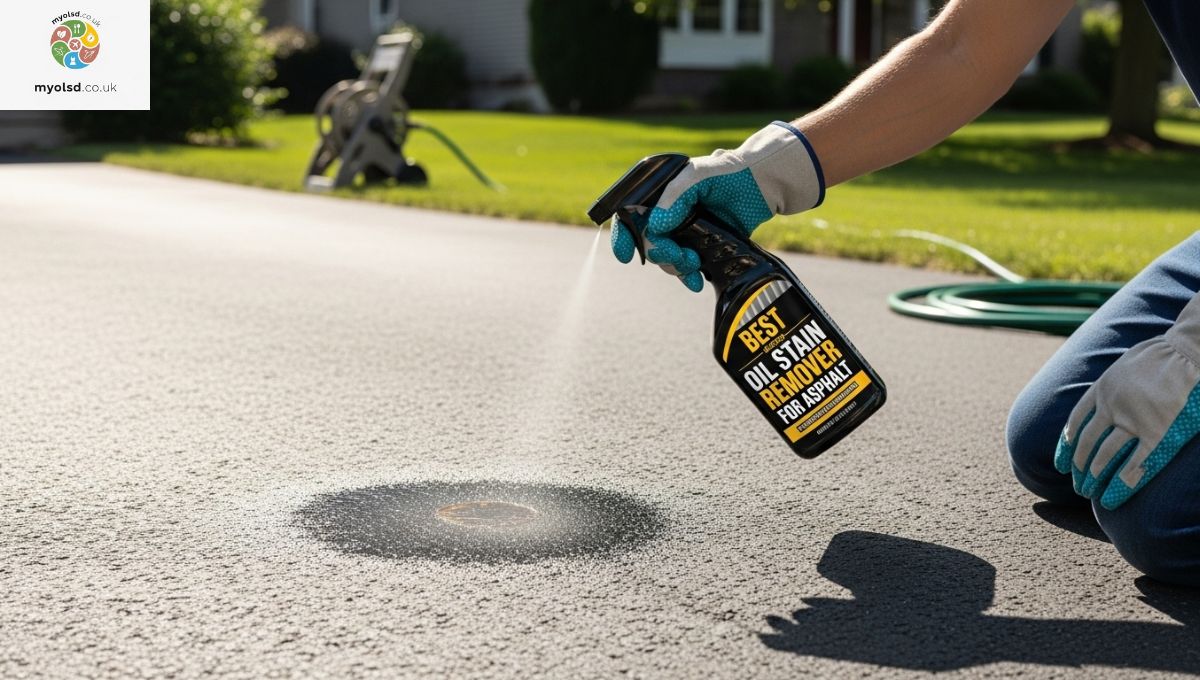
1 thought on “Best Oil Stain Remover for Asphalt Driveway: Simple Ways to Get Rid of Tough”